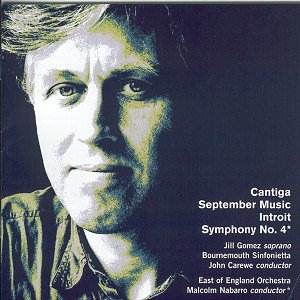This
disc is part of an exciting series on the superb NMC label that
aims to give us back catalogue and deleted issues at mid-price.
This in itself is to be applauded, but as the man behind NMC,
David Matthews’ brother and fellow composer Colin Matthews, states
in the booklet ‘NMC’s principle, from the beginning, has been
never to delete…so it’s a natural development for NMC to acquire
and re-release significant recordings that have disappeared from
view … and breathe life into music that should always be at hand’.
It is shameful that the big record companies do not have more
faith in their own catalogue, and contemporary music suffers most
from the deletion axe.
These
performances actually originated on the excellent Unicorn and
Collins labels, both of which suffered the ultimate fate, so we
really must be grateful that such superb music as here is rescued
and is now available to a whole new public. The most substantial
item is the 4th Symphony, originally a CD single
(itself a good idea), and a very imaginative and compelling piece
it is. It is classical in proportion and design (though in 5 movements)
and the scoring is even for a Haydn-like ensemble (it comes as
no surprise that it was commissioned by the English Chamber Orchestra).
Any
‘modernist’ features are consciously kept in check, and one is
aware of great harmonic, textural and, particularly, melodic content
being uppermost in the composer’s mind. There is great physical
energy here and not a little Haydnesque humour. The second movement
is an intense, rhythmic scherzo and is followed by a song-like
andante scored mainly for strings. I love the witty fourth movement,
marked fast tango, slightly manic, and it makes a quirkily
inventive replacement for the classical minuet. The whole piece
has the feeling of a real symphony, where ideas are often linked
and logically lead on to satisfying conclusions. The performance
is good rather than great, the strings being a bit stretched in
places (what a pity it’s not the ECO), but in no way does it seriously
mar enjoyment.
The
other really substantial work is Cantiga (simply the Spanish
word for song), which is subtitled The Song of Inês de
Castro, and is a dramatic scena based on a poetic narrative
by Maggie Hemingway. This famous historical ‘legend’ has proved
fertile for composers (James MacMillan chose the bloody, doomed
romance for his first opera) and Matthews has fashioned an Expressionistic
mini-opera that is powerful and brooding. The modest orchestral
forces are used with great ingenuity, particularly the two interludes,
and the whole thing lingers in the memory, so strong is the atmosphere
conjured up. The success is due in no small way to the performance
by Jill Gomez, who suggested and then commissioned the work, and
her deeply felt and superbly committed singing is unlikely to
be surpassed.
The
two smaller pieces add effective balance to the disc. September
Music is lyrical, heartfelt and almost Impressionistic in
its colours, and the string writing strikes me as continuing a
long line of great English string works. The ‘English’ connection
is also apparent in Introit, with its echoes of Tippett
(particularly the main 5-note idea) and Vaughan Williams. Indeed,
Matthews admits quite openly to paying homage to a number of English
composers in the piece which, far from sounding derivative, actually
heightens the moving sense of tradition and context. When the
two trumpets finally enter near the end, the glorious bell-like
peroration evokes a musical heritage that feels as solid as the
Cathedral setting it was designed for.
Recording
quality is first rate throughout, and performances are in the
main excellent. The presentation is ideal, with authoritative
and readable notes by the composer, together with song text and
biographies. A superb issue which deserves success.
Tony
Haywood
